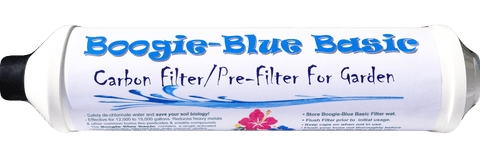Boogie Blue Filters FAQs
Q: Is that chlorine filter similar to the hard water filter I use for my mister system?
A: As far as your question about the filter, it is not designed to “soften” water in the manner that a sodium treatment filter would. You must not use “water softener” filters on your agricultural water. The sodium and other “softening” salts will harm plants! Hydroponics demands that the base water have low ppm’s (parts-per-million) so as not to imbalance the absorption of the chemical salts in the hydroponic fertilizer. With a quality compost tea and mild soil-based organic feed systems, the bacteria in the tea and healthy soil substrate will produce enzymes which work to break down the salts, or hard mineral deposits, and
render them far less hazardous to your root system. Effectively the tea and its biology becomes the “water-softener” through nature’s bacterial action and breakdown of minerals.
Q: Is there a cheaper method of filtering? I am not planning on misting the brew but I have a filter on my misters that says it takes the calcium out of the water… can I create my own filter somehow?
A: Our Boogie Blue Filter will effectively scrub the chlorine and chloramine from your city water as well as other harmful elements like fluoride, mercury, DDT, and other chemicals which kill beneficial microbes, from all water that you apply to your plants. It is a chemical filter, not an inline reverse osmosis, (RO), filter.
Q: My well water has high sodium content, which is just terrible for my garden plants. Would the Boogie Blue garden hose filter help to neutralize a decent amount of the salt in my water?
A: That is a good question and the short answer is no, the boogie blue filter will not remove “salts”, (i.e. dissolved solids), from well water. It will only remove about 10 to 15% of a source water’s dissolved solids. The other 85% or so can easily be removed with an RO, (Reverse Osmosis) system. The Boogie Blue Filter’s specialty is effectively scrubbing chemicals such as chlorine and chloramine so that soil biology can thrive. In addition, other harmful elements such as mercury, pesticides and heavy metals are removed by the Boogie Blue’s KDF55/KDF85 filtration membrane.
These kinds of substances are all antagonistic to beneficial soil microorganisms and thus harmful to healthy soil biology. Before you invest in the expense of an RO system to lower your water’s sodium levels, try to use some Boogie Brew Tea on your plants. The enzymes secreted by the beneficial organisms in a quality compost tea can work wonders to ‘soften’ or neutralize the effects from excess salts. This is something we experienced ourselves when we lived in a rural region which was plagued with excess sodium levels in the ground water.
Plants which weren’t treated with tea suffered greatly and some even died from the “burn” they experienced. Those that were given a twice weekly dose of compost tea performed far better. Although we have no doubt that the quality of results would have been considerably better still had we used the luxury of a full blown RO water system, it was nonetheless nice to achieve gardening success with our low quality sodium rich water from regular applications of Boogie Brew.
Q: Why is chlorinated water not good for soil?
“Unfortunately chlorine and chloramine compounds are used in almost all municipal water systems and thus the use of an effective filter is required for creating quality compost tea. This is due to chlorine’s functional elimination of all bacteria, including the beneficial organisms that are alive and well in high quality compost, worm castings and other “live” amendments found in good tea recipes. Do continue to use de-chlorinated water on soil previously inoculated with live teas. Otherwise you will wipe out most of the beneficial biology you just introduced into your soil. You wouldn’t use antibiotics after cultivating acidophilus in the intestine from high quality yoghurt cultures, would you? Use similar principles with compost tea for soil-success!”
Q: My filter was outside when the temperatures dropped below freezing. It was secured with hose attached on both ends 5" from the house, is it okay?
"As long as it flows normally, it should be fine. Remember that the filter acts as an insulation chamber to its water content. It usually requires a deep hard freeze/true ice-expansion to crack the filter's housing. Lifespan will be variable based on initial water hardness, etc. We usually hear about the filter slowing down the flow rate as an indicator of useful life expentency. So, if you start to see drastically lowered pressure & flow rate through your filter, then that is definitely a marker for replacement.
You can take a few preventative steps to ensure that you get as much life out of your filter as possible. As is indicated on the filter label, back-flush your filter from time to time. (Use a double-female hose adapter available at hardware stores). Also make sure that, when not in use for long periods, the ends are capped to prevent filtration material dry out, which caused your filter to lose structural porosity. Make sure that your Boogie Blue is never left out in freezing weather, as the housing can crack in extreme cold. You may also want to consider purchasing an inline sediment filter to help lower the impacts of water hardness, etc.
Q: Can it be attached to a water faucet and left in the sunshine?
"Yes, as long as it is kept capped, closed or attached to a hose, which will allow for some ambient humidity, it will be fine. Try not to stress filter when yanking hose around, some folks run a short section of 'loader hose' from their spigot first, then anchor to a suitable post before running their main hose from the filter.

